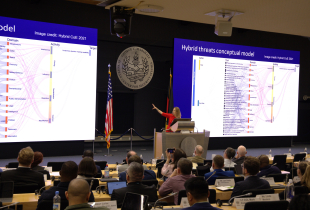
Marshall Center conducts Cyberspace Course focused on International Law in partnership with the U.S. Department of State, the Netherlands’ Ministry of Foreign Affairs
By Josh Southworth
George C. Marshall European Center for Security Studies
GARMISCH-PARTENKIRCHEN, Germany (Aug. 31, 2018) – The George C. Marshall European Center for Security Studies, the U.S. Department of State and the Netherlands’ Ministry of Foreign Affairs conducted a course focused on the applicability of international law to state behaviour in cyberspace here from Aug. 27 to 31.
This event brought together 33 cyber security practioners from 17 different countries.
The course seeks to expand on existing international cyber capacity building events. It is supported by a unique partnership with the Marshall Center, Department of State and the Netherlands that invite targeted participants to actively engage in plenary sessions, exercises and facilitated discussions that created greater understanding of international laws with regards to states’ actions in cyberspace.
Background of the Course
“The United States’ cyberspace international engagement and capacity-building efforts promote a framework of responsible state behavior in cyberspace, based on the applicability of existing international law, adherence to non-binding peacetime norms of responsible state behavior in cyberspace, and implementation of practical confidence-building measures,” said Professor Phil Lark, the course director for the Marshall Center’s Program on Cyber Security.
This course aims to enhance partner nation understanding of international law as it applies to states’ cyber activities. Participants will explore how certain international law applies to states’ use of international humanitarian law, international law governing states’ exercise of their inherent right of self-defense, and the law of state responsibility, including countermeasures. This course promoted a better understanding of how existing international law provides states with binding standards of behavior that can help reduce the risk of conflict, including by creating stable expectations of how states may and may not respond to cyber incidents.
The Importance of the Course and impact on participants
“This event gave me best practices from speakers and participants to help respond and prevent future cyberattacks,”said Korbsiri Iamsuri, from the Thailand Ministry of Digital Economy and Society.
The Course educated partner nation policymakers and international lawyers who participate in multilateral settings and who advise on how international law applies to their states’ cyber activities. It provided a practice-oriented survey of international law as it applies to states’ conduct in cyberspace. The Course also promoted an understanding of the importance of states affirming that existing international law is applicable to their cyber activities, as well as an understanding of how international law provides a framework for international stability in cyberspace by bringing predictability to state conduct, thereby helping to prevent misunderstandings that could lead to conflict.
Mariana Galan, a participant from Argentina with a non-governmental agency, noted “this event will help to improve cyber security capacity building by helping to balance international cooperation with internal security.”
The Way Forward
Following the course the participants had gained greater awareness of a variety of bodies of international law that are relevant to states’ cyber activities. They understood the application of the international laws while underscoring the importance of following the laws. They understood states’ options for responding to malicious cyber activity within the lawful international framework.
The next cyber event for the Marshall Center is the Program on Cyber Security Studies, which is the three-week resident course that will host up to 75 international, cyber security practioners. The course runs from Dec. 4 to 20.
